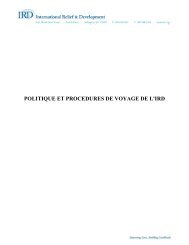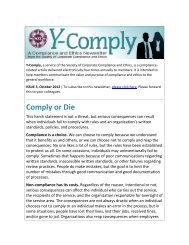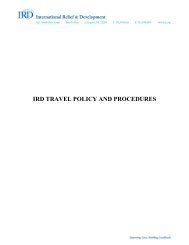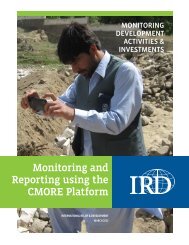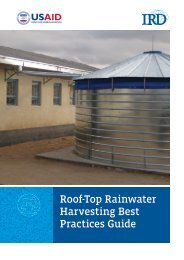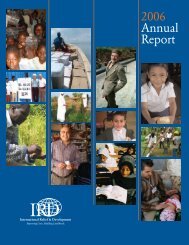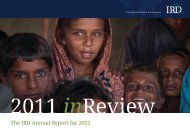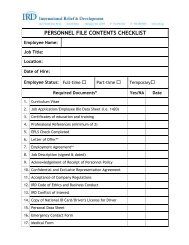Empowering citizens Engaging governments Rebuilding communities
Empowering citizens Engaging governments Rebuilding communities
Empowering citizens Engaging governments Rebuilding communities
Create successful ePaper yourself
Turn your PDF publications into a flip-book with our unique Google optimized e-Paper software.
“<br />
We learned from our experiences, and<br />
we moved forward with a stronger and<br />
better understanding of stabilization”<br />
—Alaa Ismael<br />
4<br />
Converting roadblocks into a roadmap<br />
requirements while giving fieldworkers the flexibility to<br />
operate, became one of IRD’s most important recommendations<br />
for future stabilization operations. “With<br />
CSP, there were challenges that any other program an<br />
NGO would normally manage would never face,” said<br />
Alaa Ismael, the nationwide manager for CIES activities.<br />
“But that wasn’t a reason to shy away, even if it<br />
was hard to manage.”<br />
Administrative closeout of a typical development<br />
program can take up to three months to wrap up the<br />
bookkeeping, finalize the paperwork, square up the<br />
payroll, and so forth. Once that all happens, final<br />
audit teams from the donor will come in and do a<br />
closeout audit, which normally lasts anywhere from<br />
a few weeks to up to a year, depending on the size<br />
of the program. Given the cost and scale of CSP, as<br />
well as the extra attention it generated, the closeout<br />
process lasted for more than two years and endured<br />
three “final” closeout audits. For many IRD staff, the<br />
program’s end marred what had been a productive<br />
and groundbreaking union of development principles<br />
and COIN objectives, which led to successful stabilization<br />
operations throughout Iraq—exactly what CSP<br />
was intended to do. “When you take a broad view of<br />
everything, it was definitely a success,” Warmke said.<br />
By September 2011, the US government agreed. Two<br />
firms, the Defense Contract Audit Agency and PriceWaterhouseCoopers,<br />
had contested approximately $59<br />
million in CSP costs and expenses. But in the end, IRD<br />
provided the full documentation required to have all but<br />
$239,000 disallowed. At just a tenth of 1 percent, the<br />
disallowance on CSP, the largest assistance program in<br />
USAID history, was well below the industry norm of 3–5<br />
percent. In a staff memo announcing the final determination,<br />
IRD President Dr. Arthur B. Keys reaffirmed the<br />
organization’s commitment to “100 percent compliance<br />
all the time on all programs,” and he reiterated that the<br />
findings were a testament to IRD’s ability to achieve<br />
extraordinary outcomes in difficult environments. “We<br />
had challenges, but with the challenges we also had<br />
great successes,” Alaa Ismael said. “We learned from<br />
our experiences, and we moved forward with a stronger<br />
and better understanding of stabilization.”<br />
Strategic recommendations for future COIN<br />
programs<br />
CSP’s challenges included maintaining community<br />
support while simultaneously maintaining an effective<br />
military collaboration. At the same time, insecurity and<br />
local corruption exacerbated difficulties with monitoring<br />
and evaluation, staffing, and project management.<br />
These challenges, which have been highlighted<br />
throughout this review, offer invaluable learning<br />
opportunities for future COIN programs, or even for<br />
development work in a conflict zone.<br />
Community support: Invest in it<br />
The hold phase of COIN’s “clear-hold-build” strategy<br />
relies on gaining local support by assisting the population,<br />
and as military and civilian leaders repeatedly<br />
pointed out, civilian agencies are much better equipped<br />
to enable that outcome. The military was flooding<br />
Baghdad and other cities with CERP funds, which<br />
dwarfed CSP’s expenditures, but that investment did<br />
not bring what CSP brought: an Iraqi face. From the<br />
beginning, IRD emphasized that CSP was implemented<br />
by and for Iraqis. IRD employed a large Iraqi national<br />
staff who could understand and empathize with the<br />
needs of the community. “The importance of those<br />
years with ICAP cannot be understated,” Iqbal al-Juboori<br />
said. “The base of support we had in Baghdad ahead of<br />
CSP was so strong, that’s what allowed us to expand.<br />
We already knew what it took to get people to trust us.<br />
They trusted us because we had worked with them.”<br />
IRD applied what it learned about the importance of<br />
earning local trust in Serbia and Montenegro to its early<br />
days in Baghdad. IRD built on that knowledge with ICAP<br />
58


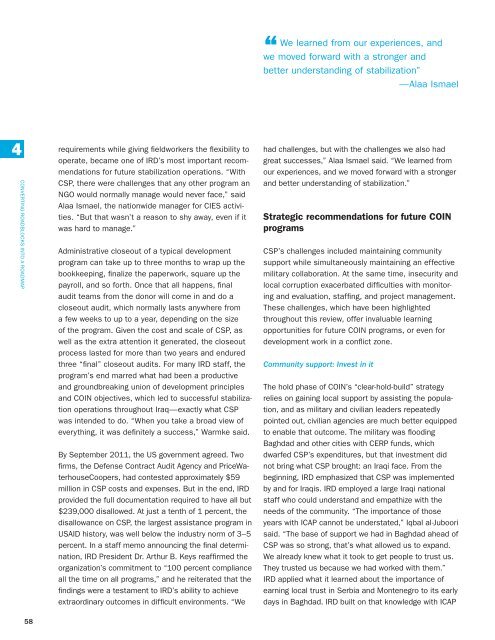
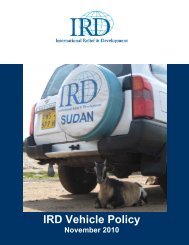
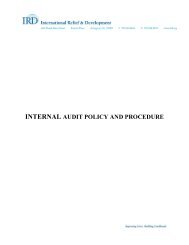
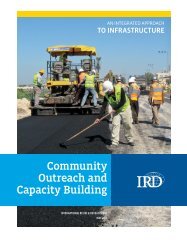
![Guide bonne pratique production d'oignon qualité_VF_4_2411012[1]](https://img.yumpu.com/23506639/1/184x260/guide-bonne-pratique-production-doignon-qualitac-vf-4-24110121.jpg?quality=85)
